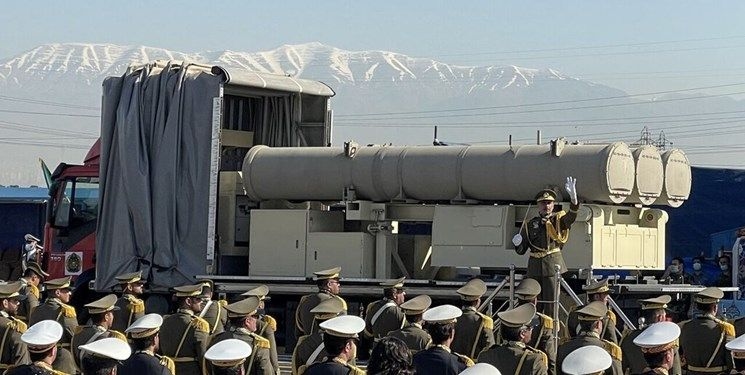Will the Middle East crisis affect Iran's supply of ballistic missiles to Russia? It's complicated
Iran supplied different range missiles to Russia than it fired upon Israel but expert says Tehran may need them too if bigger war erupts in the Middle East

Many rockets, fired from Iran, are seen over Jerusalem from Hebron, West Bank on Oct. 1, 2024. The Israeli army announced that missiles were fired from Iran towards Israel and sirens were heard across the country, especially in Tel Aviv. (Wisam Hashlamoun/Anadolu via Getty Images)
Russia's supply of ballistic missiles from Iran, confirmed last month by the U.S., is not expected to be immediately affected by escalating tensions in the Middle East, but two complicating factors could cause longer term issues.
Iran launched its largest-ever aerial attack against Israel on Oct. 1, with nearly 200 missiles fired that day, sparking fears of a broader war in the region.
According to the Israeli Defense Force (IDF), 180 of them were ballistic missiles.
Which begs the question — will Iran's recently increased need for ballistic missiles affect the still relatively fledgling supply of them to Russia?
According to Fabian Hinz, a research fellow for defense and military analysis at the International Institute for Strategic Studies, the answer is "a little bit complicated."
Though reports over a period of months mentioned several different candidates for the type of missiles Iran was sending Russia, U.S Secretary of State Antony Blinken last month confirmed it was the Fath-360 that had been delivered.

The Fath-360 is a close-range ballistic missile with a 150-kilogram warhead, and a range of 120 kilometers.
Given the shortest distance between Israel and Iran is around 1,000 kilometers, Fath-360s would have little value in an all-out war between the armed forces of the two countries.
If the U.S. became involved and Iran wanted to target U.S. military targets in the region, they would also be of little use.
"The Iranians themselves don't really need them in a confrontation with Israel and the U.S.," Hinz told the Kyiv Independent, pointing out Iran has several other models specifically for such purposes.
After the Oct. 1 attack, Tehran claimed it had used four different types of ballistic missile in the strike, the Emad, Ghadr, Kheibar Shekan, and Fattah-1, all with a range capable of striking Israel.
"The kind of missiles that Iran uses to attack Israel were never really on the table for use in Ukraine because the range is not what the Russians need," Hinz said. Since it’s a tactical system, Moscow will likely use Iran's Fath-360 to strike critical assets in the Ukrainian rear areas, for example, logistics bases, weapons depots, and air defense systems.
"The kind of missiles that Iran uses to attack Israel were never really on the table for use in Ukraine because the range is not what the Russians need."
Obtaining Fath-360 means Russia is now free to save its own more expensive and further reaching missiles, such as the Iskander, for longer-range strikes into Ukraine.
From the perspective of what the armed forces of Russia and Iran both currently need from a ballistic missile system, the war in Ukraine, and a broader war in the Middle East are unlikely to affect supplies of Fath-360s to Moscow.
"That being said, these missiles could be supplied to proxies," Hinz adds.
According to the Wilson Center, Iran funds, arms, and trains proxy militia groups in at least six countries — Bahrain, Iraq, Lebanon, the Palestinian Territories, Syria and Yemen.
In the event of a broader war in the Middle East, it's highly likely Iran would bring them into play, and given many of these groups are far closer to Israel and U.S. bases, the ability to hit them with short-range ballistic missiles would be useful for Tehran.
"When it comes to really short-range stuff, the real competition would be between supplying them to Russia or supplying them to Iranian proxies," Hinz said.
"You'd maybe supply them to Iraqi militias so you could fire them at US bases, for example."
There's one more factor that could affect Russia's supplies. While Iran may not have a strong need itself for Fath-360s, there are several overlaps in the production process for different models of ballistic missile.

Hinz describes what we know for certain about Iran's ballistic missile production process as "murky," but says an increased need for long-range weapons could create bottlenecks for the production of short-range models.
"We don't know exactly where (Fath-360s) are being produced but it could be possible that the facilities they're being produced at also produce the longer range stuff, especially when it comes to solid-propellant motors," he said.
"Sometimes you have facilities that produce both large and small solid propellant motors, so then you would have a bit of a conflict of interest.
"Another issue is the motors use the same propellant that the longer range missiles use, so that's also an area where you could run into competing interests."
With no Fath-360s so far reported as being used in Ukraine and the world awaiting Israel's response to Iran's Oct. 1 attack, medium and long-term events in both wars are difficult to predict.
"The situation in the Middle East will probably not yet affect Iranian supplies of ballistic missiles to Russia, especially if you already have a deal done," Hinz concludes, adding: "But Iran might see resupplying proxies as a major imperative after the last few weeks‘ events."








